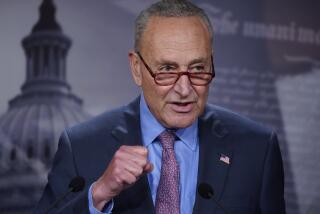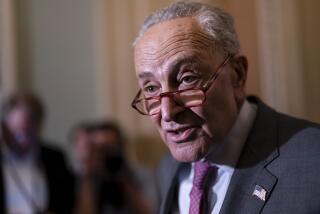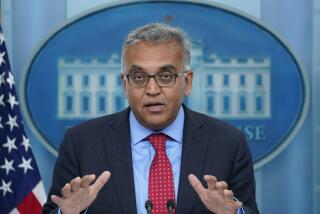Congress Misses Its Chance to Jolt the Economy
- Share via
Under pressure from President Bush, House and Senate negotiators are laboring to resuscitate the comatose economic stimulus bill. But it increasingly appears Congress would be better off pulling the plug. The stimulus plan looks like an idea whose time has come--and gone. Washington might want to save the $75 billion or $100 billion the stimulus plan would cost, because all signs are that it will need that money, and more, to meet the demands of the coming years.
Historically, the rap on congressional efforts to goose the economy is that they come too late to matter. Whatever economic jolt Washington provides from new spending or tax cuts is often diluted, because the money drips out of the pipeline only after the economy has recovered on its own. By allowing the partisan stalemate over the stimulus bill to persist for so long this fall, Congress has put itself behind the curve again.
New home construction, car sales, holiday retail sales, the rising stock market--all point to the first stirrings of recovery. It’s true that the National Bureau of Economic Research last week officially labeled the economy in recession. But even that announcement may have weakened the case for the stimulus plan.
The bureau said the economy fell into recession in March. Since World War II, the average U.S. recession has lasted 11 months. That means the country may be about two-thirds of the way through the current downturn. By the time Congress gets tax cuts or new spending out the door, the worst could well be over. In this case the watchwords should be: Better never than late.
Already the delay on Capitol Hill has invalidated one of the plan’s principal justifications. New tax cuts for individuals have been sold largely as a way to increase consumer spending for Christmas. But no plan approved now could put money in shoppers’ pockets quickly enough to do that; it’s unlikely that Congress could even act fast enough to influence spending decisions through the promise of future tax cuts. The most that new tax cuts might accomplish is to help Americans pay down their credit card debts faster next year. But, as one Democratic economist acknowledges, “if people use a tax cut to pay down debt, you are one more step removed from stimulating the economy.”
The recent hints of recovery are indeed only that; unemployment is likely to continue rising for several more months. But it’s dubious that the stimulus proposals now under discussion will change that trajectory much. Constrained by the deteriorating federal budget picture, the packages probably aren’t big enough to shock the system. Even President Bush’s top economist last week said the plans would have only a “pretty modest” impact on the economy. “Would the economy recover without it?” said R. Glenn Hubbard, chairman of the Council of Economic Advisers. “Of course. It’s a $10-trillion economy.”
But if a $100-billion stimulus plan is chump change in a $10-trillion economy, it’s real money in a federal budget suddenly facing a return to deficits. Less than a year ago, the Congressional Budget Office was still estimating that the government would accumulate a cumulative surplus of $1.35 trillion through Bush’s first term. After last summer’s massive tax cut, the recession and the costs of responding to the Sept. 11 attacks, those prospective piles of cash have vanished. Last week, Office of Management and Budget Director Mitchell E. Daniels Jr. said the administration was now projecting that the government would run deficits every year through 2004.
And he’s not talking about the nouvelle sort of deficit that’s concerned Washington lately--a shortfall when government is forced to tap Social Security revenue to fund other programs. Daniels was projecting an old-fashioned deficit where the government spends more than its revenue from general taxes and Social Security combined, and is forced to increase the national debt to cover the bills.
That pending squeeze on the budget demands that Congress carefully weigh each dollar it commits against all alternate uses. Under that standard, it’s difficult to justify any of the proposed tax cuts in the stimulus bill.
Consider the Democrats’ top priority in the discussions--a $600 tax rebate for working poor families who didn’t earn enough to benefit from last summer’s rebates. That would cost about $14 billion next year. But with that much money, Congress could fund almost the full package of homeland security measures Senate Democrats are pushing. Alternately, that’s enough money to cover half the $28 billion Congress promised in last summer’s budget resolution to expand health care coverage to millions of working poor adults, a promise that now appears unlikely to be kept. Would a one-time tax rebate really help the working poor more than an ongoing commitment to ensuring them health care?
Even more absurdly, the stimulus plan that the House approved on a virtually party-line vote would spend $25 billion eliminating the corporate minimum tax and providing refunds to big companies such as General Motors Corp. and IBM Corp., which have paid it over the last 15 years. Last year, congressional Democrats estimated that much money could fund renovations at about 15,000 public schools. If that $25 billion is really burning a hole in the legislators’ pockets, would it really do more good lavishing it on profitable companies--or making it a down payment on the $127 billion in repairs that the Education Department says are needed in public schools?
All of this suggests Congress might be best served to strip back the stimulus plan to the absolute essentials--an extension of unemployment and health care benefits for workers displaced after Sept. 11. That would limit the package’s cost to about $15 billion.
That would be a step back toward fiscal sanity; you can’t get out of a hole until you stop digging it deeper. But to truly escape this new deficit trap, Washington probably has no alternative but to reconsider the $1.35-trillion tax cut Bush pushed through Congress last summer. Senate Democrats have been terrified of reopening that debate. But if the budget numbers remain bleak, the odds are overwhelming that sometime before 2004, Bush and the Democrats will collide over whether to defer the next installments of the tax cut. Passing more tax cuts in an ill-timed stimulus plan now would only move that day closer.
*
Ronald Brownstein’s column appears every Monday. See current and past Brownstein columns on The Times’ Web site at:https://www.latimes.com/brownstein.
More to Read
Get the L.A. Times Politics newsletter
Deeply reported insights into legislation, politics and policy from Sacramento, Washington and beyond. In your inbox twice per week.
You may occasionally receive promotional content from the Los Angeles Times.










